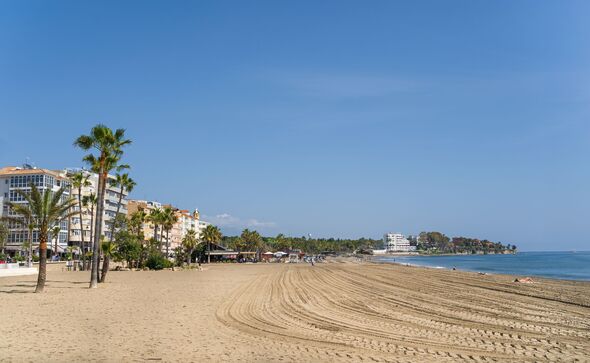British tourists headed for Spain have been warned to be aware of the laws in different parts of the country and its islands. This is due to the fact that there is no national regulation on certain issues but different municipal ordinances, making it difficult to know what rules slide where.
Urinating on the beach is one of the most common penalties, with fines of up to 1,500 euros (£1,280).
In holiday hotspots such as Marbella in Malaga, one of Spain’s top destinations for foreign tourists in the Mediterranean, the issue has made international headlines.
The city introduced the fine this year in an attempt to combat beach pollution and ensure a clean coastline. The proposal from earlier this year was drafted to include 25 beaches in the Malaga municipality.
A previous legislation introduced in 2004 saw tourists face fines of up to 300 euros (£256).
Beachgoers can now be fined around 750 euros (£640) for a first offence, but the penalty could be doubled for reported offenders who breach the new regulation within a year. Dogs are also to be kept out of the sea and will be designated specific dog-friendly beaches.
The new rule on urinating on the beach, approved by Marbella’s city council on June 21, left many tourists confused over its murky wording of “physiological evacuation in the sea and on the beach”.
A city council spokesperson clarified the proposals to The Guardian, stating that the urination fines would not apply to open water, so beachgoers can continue to go about such business in the sea.
“It will not be applicable. The bylaw regulates possible antisocial infractions on the beach, just as any such acts are regulated in any public space such as on the city’s streets,” he added.
Elsewhere in Spain, in some southern coastal areas, the use of loudspeakers on beaches is prohibited, with fines of up to 700 euros (£597) being incurred. In the Canary and Balearic islands, tourists wishing to take home a shell souvenir may end up paying as much as 3,000 euros (£2,560).
Lighting fires or BBQs without permission may result in penalties of £1,280, while unauthorised vendors can face £2,560 fines. Cycling, jet skiing and surfing are often also prohibited within 200 metres of the shore of the Costa del Sol.
Tourists in Benidorm could face fines of up to 1,200 euros (£1,024) for visiting beaches between midnight and 7am, with swimming, sleeping and camping on the beach also prohibited during these hours. One of the largest fines British tourists risk in the incredibly popular destination is for smoking on the beach – an offence that could cost them 2,000 euros (£1,707).
On the Galician coast of Nigran, Pontevedra, fines of up to 200,000 euros (nearly £171,000) can be imposed on those who break the ban on digging holes in the sand. Police use drones to ensure compliance with the rules.
